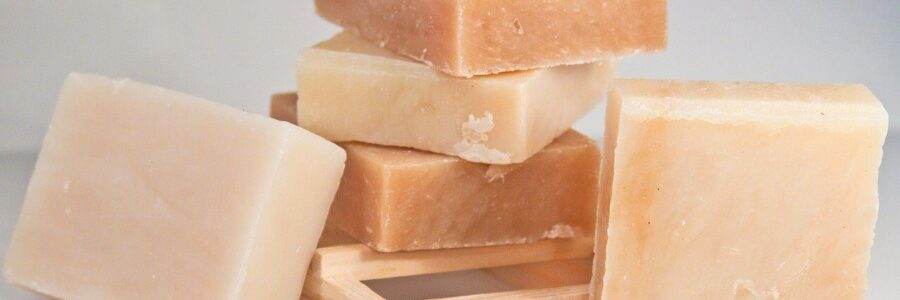Our skin needs to stay clean for us to stay healthy. But the soap we use both on our hands or in the shower can exacerbate skin conditions and skin sensitivities if we’re not careful.
No one soap is the best, and what works for one person’s skin may not be right for yours. With that in mind, here are some tips on choosing the right soap for you.
Cleaning Power
As far as reducing the spread of Covid and other germs, washing your hands for 20 seconds with bar, liquid, or foam soap will generally do the job. However, foam soaps are the least effective in reducing bacterial load on your skin, precisely because foam soap contains less actual soap per pump than liquid soap. When volunteers washed with foam soap, the average bacterial colony count on each hand went from 3.6 to 2.6. With liquid soap, the colony count went from 3.8 to 1.2 – according to a report from the American Journal of Infection Control.
Another possible weakness of foam soap’s cleaning power is that it comes out of the pump as a lather. This means you don’t have to rub your hands together as long to create that “feel good” lather. That might lessen handwashing time and reduce the friction that bar soap and liquid soap need to produce lather.
Sulfates and Suds
Lather is a tricky issue. We love it and it feels good, but the chemicals that make soap sudsier can actually be irritants. The main additive that increases lather is sodium lauryl sulfate, which is a common eczema trigger. Sulfates can irritate skin, eyes, and lungs, so read labels and try to avoid them. Sulfate-free soaps may not lather as well, but the cleaning power should still be there.
Sulfates can also clog pores and exacerbate acne. Unfortunately, most liquid and foaming soap do contain sulfates. If you determine your skin is sensitive to sulfates, or that it’s an acne trigger for you, you’ll find more sulfate-free options in a solid bar or oil-based soaps and shampoos.
Soaps Can Be Drying
Liquid soap is often better for dry skin, as it usually contains moisturizers. Soaps also have varying pH levels. Bar soaps having a higher pH than most liquid soap, so are more drying. Lower pH values are less drying, plus soaps that have a lower pH will feel gentler on your skin. Skin itself has a pH value of 5.5, so look for soaps that are pH balanced.
Foaming soaps can contain alcohol, which is a drying agent. Alcohol strips your skin of its protective layer of natural oils and fats. It’s also why, if dry skin or eczema poses a problem for you, you’ll want to avoid hand sanitizers, as sanitizers are made mostly of alcohol. Of course, use whatever you must if you are out in public and need to stay virus and germ-free, but follow up with a moisturizer as soon as you can.
With eczema you’ll want to be sure whatever soap you choose contains a gentle moisturizer made for sensitive skin. Look for soaps with a glycerin, oatmeal, or coconut oil base for natural moisture.
Read the Labels – Simple is Best
Always treat what goes on your skin the same way you treat what you put in your body. Toxic chemicals can be absorbed through your skin, and those in soap products are no exception. Whether its bar soap, liquid or foam soap, if you have eczema, TSW, or psoriasis, you’ll want to choose soaps that are:
- hypo-allergenic
- fragrance and dye-free
- free of sulfates, especially sodium lauryl sulfate
- free of petroleum products
Also, avoid soaps labeled “anti-bacterial” or “deodorant” as they contain chemicals that can irritate your skin. Research shows that anti-bacterial soaps are no more effective at killing germs on your skin than regular soap.
Easy Does It!
Like any personal care product or cosmetic, before dousing your whole body with your new soap, or even washing your hands, do a patch test to see if your skin is sensitive to the new product. Rub just a small bit on your forearm or place where you skin is not currently flaring up. Wait a few hours and see if there is any redness or rash or unusual sensation that might signal a sensitivity. Stop using any product immediately if you suspect it may be irritating your skin.
Want to Learn More About Skin Health?
Click HERE to get the Amethyst Holistic Skin Solutions Newsletter. You’ll receive interesting information about skin health via articles, before/after pictures, case studies of Amethyst patients, videos, interviews and more. Feel free to share this article with someone who you think may benefit.
About the Author
Olivia Hsu Friedman, LAc, Dipl.OM, DACM, Cert. TCMDerm, is the owner of Amethyst Holistic Skin Solutions and treats Acne, Eczema, Psoriasis, and TSW. Olivia treats patients via video conferencing using only herbal medicine. Olivia is Chair of the Board of Directors of the American Society of Acupuncturists, serves on the Advisory Board of LearnSkin, and is a faculty member of the Chicago Integrative Eczema Group sponsored by the National Eczema Association.



